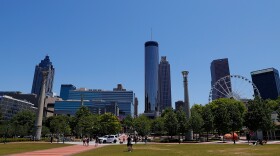
Nathan Rott
Nathan Rott is a correspondent on NPR's National Desk, where he focuses on environment issues and the American West.
Based at NPR West in Culver City, California, Rott spends a lot of his time on the road, covering everything from breaking news stories like California's wildfires to in-depth issues like the management of endangered species and many points between.
Rott owes his start at NPR to two extraordinary young men he never met. As the first recipient of the Stone and Holt Weeks Fellowship in 2010, he aims to honor the memory of the two brothers by carrying on their legacy of making the world a better place.
A graduate of the University of Montana, Rott prefers to be outside at just about every hour of the day. Prior to working at NPR, he worked a variety of jobs including wildland firefighting, commercial fishing, children's theater teaching, and professional snow-shoveling for the United States Antarctic Program. Odds are, he's shoveled more snow than you.
-
Temperatures topped triple digits in parts of the state, and the weather is expected to remain blistering well into next week, likely putting more pressure on the electric utilities.
-
 'We Had To Get Out': Despite The Risks, Business Is Booming At National ParksVisits to Yellowstone National Park are higher than last year as Americans look to escape their pandemic confines. Their business is welcome relief, despite worries they'll also bring coronavirus.
'We Had To Get Out': Despite The Risks, Business Is Booming At National ParksVisits to Yellowstone National Park are higher than last year as Americans look to escape their pandemic confines. Their business is welcome relief, despite worries they'll also bring coronavirus. -
Power shut-off moratoriums imposed at the start of the pandemic are beginning to expire. Customers and utilities face a backlog of missed bills that may eventually be passed on to ratepayers.
-
Scientists say accelerating deforestation and development may increase the risk of pandemic diseases. The current economic crisis may also make that trend worse if more people cut down trees for fuel.
-
Despite heavy police and military presence and an extended curfew in many places, protests for George Floyd have persisted nationwide – and the majority of them have been peaceful.
-
A new study finds rising temperatures and climate-driven disasters are helping transform the very makeup of the world's forests. This has major implications for biodiversity and more warming.
-
Scientists are racing to better understand atmospheric rivers, bands of moisture that start in the tropics and can bring torrential rain to the U.S. They're projected to intensify with climate change.
-
Gov. Gavin Newsom announced that the state would start a partial reopening at the end of the week — joining a growing list of states that are trying to restart their economies.
-
 As States Reopen, Health Experts Seek To Understand Coronavirus's Early Silent SpreadMedical examiners are now screening for possible coronavirus connections in late January. Emerging evidence suggests it spread far earlier and more widely than initially believed.
As States Reopen, Health Experts Seek To Understand Coronavirus's Early Silent SpreadMedical examiners are now screening for possible coronavirus connections in late January. Emerging evidence suggests it spread far earlier and more widely than initially believed. -
If a major hurricane, flood or wildfire happens during the pandemic, evacuation shelters could be dangerous and cross-state aid impossible. So disaster response experts are planning new strategies.





